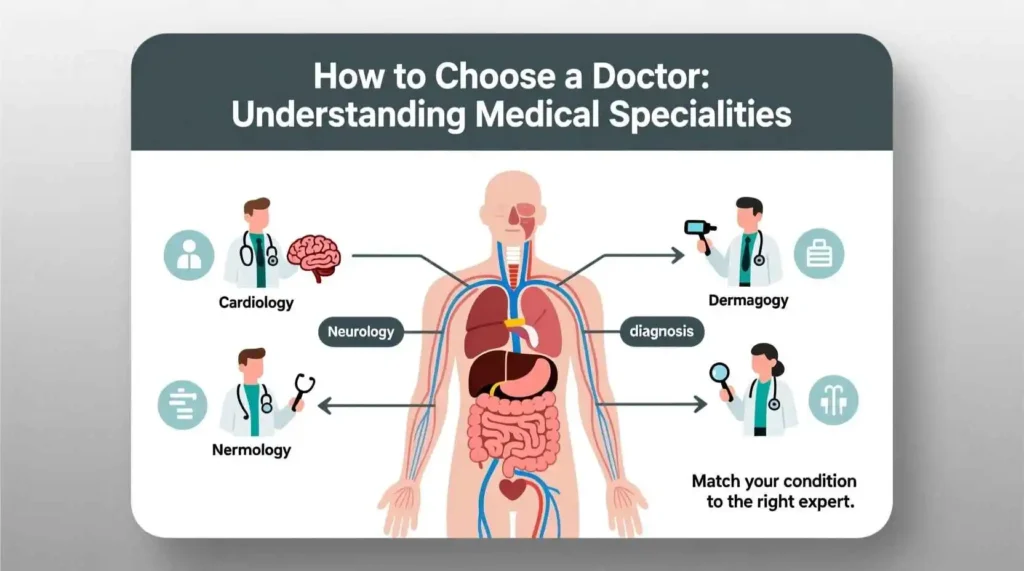
Doctors, Diseases & Decisions: Navigating Medical Specialties
The field of medicine is a vast and intricate landscape, with numerous specialties each dedicated to specific aspects of human health. Understanding the different types of doctors, their job descriptions, and the diseases they consult on can help patients navigate the healthcare system more effectively. This comprehensive guide explores the various medical specialties, providing insights into the expertise of each type of physician and the conditions they treat.
Introduction to Medical Specialties
Medicine has evolved significantly from the days when a single physician would handle all health concerns. Today, medical professionals undergo extensive training in specialized areas to provide the most knowledgeable and effective care possible. This specialization allows doctors to develop deep expertise in specific body systems, diseases, patient populations, or treatment modalities.
After completing medical school, doctors typically undertake residency programs in their chosen specialty, which can last anywhere from three to seven years. Many then pursue additional fellowship training for further sub specialization. This rigorous training ensures that each specialist is equipped with the knowledge and skills necessary to diagnose and treat specific medical conditions with precision.
Internal Medicine and Its Subspecialties
Internists
Internal medicine physicians, or internists, are specialists who diagnose, treat, and manage a wide range of conditions in adults. They serve as primary care physicians for many adults and are particularly skilled in managing complex, multisystem diseases.
Job Description: Internists are trained to handle whatever problem a patient brings, whether simple or complex. They perform comprehensive physical examinations, interpret diagnostic tests, prescribe medications, and develop treatment plans. Internists often coordinate care with other specialists when necessary.
Diseases They Consult: Internists manage common illnesses such as hypertension, diabetes, heart disease, and respiratory infections. They also treat more complex conditions like autoimmune disorders, metabolic syndrome, and multisystem diseases. Internists are often consulted for diagnostic puzzles when the cause of symptoms is unclear.
Cardiologists
Cardiologists are internists who specialize in the diagnosis and treatment of diseases related to the cardiovascular system, including the heart and blood vessels.
Job Description: Cardiologists evaluate patients with suspected or known heart disease through physical examinations, electrocardiograms, echocardiograms, stress tests, and cardiac catheterization. They develop treatment plans that may include medications, lifestyle modifications, or procedures such as angioplasty or stent placement. Some cardiologists specialize in interventional procedures, while others focus on heart failure, electrophysiology, or preventive cardiology.
Diseases They Consult: Cardiologists treat conditions such as coronary artery disease, heart attacks (myocardial infarction), arrhythmias, heart failure, valvular heart disease, congenital heart defects, and hypertension. They also manage risk factors for heart disease, including high cholesterol and high blood pressure.
Gastroenterologists
Gastroenterologists specialize in the diagnosis and treatment of conditions affecting the digestive system, including the esophagus, stomach, small intestine, colon, rectum, pancreas, gallbladder, bile ducts, and liver.
Job Description: Gastroenterologists perform endoscopic procedures such as colonoscopies, upper endoscopies, and sigmoidoscopies to examine the digestive tract. They interpret imaging studies and laboratory tests related to digestive health and develop treatment plans that may include medications, dietary modifications, or procedures to remove polyps, stop bleeding, or dilate narrowed areas.
Diseases They Consult: Gastroenterologists treat conditions such as gastroesophageal reflux disease (GERD), inflammatory bowel disease (Crohn’s disease and ulcerative colitis), irritable bowel syndrome (IBS), celiac disease, liver diseases (including hepatitis and cirrhosis), gallbladder disease, pancreatic disorders, and gastrointestinal cancers.
Endocrinologists
Endocrinologists specialize in the endocrine system, which includes glands that produce hormones regulating metabolism, growth and development, tissue function, sexual function, reproduction, sleep, and mood.
Job Description: Endocrinologists diagnose hormone imbalances through blood tests, imaging studies, and stimulation or suppression tests. They develop treatment plans that may include hormone replacement therapy, medications to block hormone production, or management of underlying conditions. They often work closely with patients to manage chronic conditions that require ongoing monitoring and adjustment of treatment.
Diseases They Consult: Endocrinologists treat diabetes mellitus (type 1 and type 2), thyroid disorders (hypothyroidism, hyperthyroidism, thyroid nodules, and thyroid cancer), adrenal disorders, pituitary disorders, metabolic bone diseases (osteoporosis), lipid disorders, obesity, and reproductive endocrine disorders (polycystic ovary syndrome, infertility).
Nephrologists
Nephrologists specialize in the diagnosis and treatment of kidney diseases and disorders of fluid and electrolyte balance.
Job Description: Nephrologists evaluate kidney function through blood tests, urine tests, imaging studies, and kidney biopsies. They manage conditions that affect kidney function and develop treatment plans that may include medications, dietary modifications, dialysis, or kidney transplantation. They also manage hypertension, particularly when it’s related to kidney disease.
Diseases They Consult: Nephrologists treat acute kidney injury, chronic kidney disease, end-stage renal disease, glomerulonephritis, polycystic kidney disease, kidney stones, electrolyte imbalances, and hypertension related to kidney disease. They also provide care for patients on dialysis and those who have undergone kidney transplantation.
Pulmonologists
Pulmonologists specialize in the respiratory system, including the lungs, bronchial tubes, and upper respiratory tract.
Job Description: Pulmonologists evaluate patients with respiratory symptoms through physical examinations, pulmonary function tests, chest X-rays, CT scans, and bronchoscopies. They develop treatment plans that may include medications, inhalers, oxygen therapy, pulmonary rehabilitation, or mechanical ventilation. They often manage chronic conditions that require long-term monitoring and treatment adjustments.
Diseases They Consult: Pulmonologists treat asthma, chronic obstructive pulmonary disease (COPD), pneumonia, tuberculosis, pulmonary fibrosis, sleep apnea, lung cancer, pulmonary hypertension, and occupational lung diseases. They also manage patients requiring critical care who have respiratory failure.
Rheumatologists
Rheumatologists specialize in the diagnosis and treatment of rheumatic diseases, which are conditions characterized by inflammation, pain, and swelling in joints, muscles, and connective tissues.
Job Description: Rheumatologists evaluate patients with joint and musculoskeletal pain through physical examinations, blood tests, imaging studies, and sometimes joint aspirations or biopsies. They develop treatment plans that may include medications to reduce inflammation and modify disease progression, physical therapy, and lifestyle modifications. They often manage chronic conditions that require ongoing monitoring and treatment adjustments.
Diseases They Consult: Rheumatologists treat rheumatoid arthritis, osteoarthritis, gout, lupus, Sjögren’s syndrome, scleroderma, vasculitis, ankylosing spondylitis, psoriatic arthritis, and fibromyalgia. They also manage autoimmune diseases that affect multiple organ systems.
Hematologists
Hematologists specialize in disorders of the blood, blood-forming organs, and blood clotting mechanisms.
Job Description: Hematologists evaluate patients with blood disorders through blood tests, bone marrow aspirations and biopsies, and genetic testing. They develop treatment plans that may include medications, blood transfusions, bone marrow transplantation, or chemotherapy. They often work closely with oncologists, as many blood disorders are cancerous.
Diseases They Consult: Hematologists treat anemia, sickle cell disease, thalassemia, hemophilia, leukemia, lymphoma, myeloma, bleeding disorders, clotting disorders, and myeloproliferative neoplasms. They also manage patients who require regular blood transfusions or anticoagulation therapy.
Oncologists
Oncologists specialize in the diagnosis and treatment of cancer.
Job Description: Oncologists diagnose cancer through biopsies, imaging studies, and laboratory tests. They develop treatment plans that may include chemotherapy, radiation therapy, immunotherapy, targeted therapy, or hormonal therapy. They work closely with surgeons and radiation oncologists to provide comprehensive cancer care. Oncologists also manage cancer-related symptoms and side effects of treatment.
Diseases They Consult: Oncologists treat various types of cancer, including breast cancer, lung cancer, colorectal cancer, prostate cancer, skin cancer, gynecological cancers, hematological cancers, and rare cancers. Some oncologists specialize in specific types of cancer or treatment modalities.
Infectious Disease Specialists
Infectious disease specialists diagnose and treat infections caused by bacteria, viruses, fungi, and parasites.
Job Description: Infectious disease specialists evaluate patients with suspected or confirmed infections through physical examinations, laboratory tests, and imaging studies. They develop treatment plans that may include antibiotics, antiviral medications, antifungal medications, or antiparasitic medications. They often consult on complex or unusual infections and provide guidance on infection prevention and control.
Diseases They Consult: Infectious disease specialists treat HIV/AIDS, tuberculosis, hepatitis, meningitis, pneumonia, sepsis, travel-related infections, hospital-acquired infections, antibiotic-resistant infections, and tropical diseases. They also manage immunocompromised patients who are at increased risk for infections.
Allergists and Immunologists
Allergists and immunologists specialize in the diagnosis and treatment of allergies, asthma, and immune system disorders.
Job Description: Allergists and immunologists evaluate patients with allergic or immunologic conditions through physical examinations, allergy testing (skin tests or blood tests), pulmonary function tests, and sometimes challenge tests. They develop treatment plans that may include medications to control symptoms, allergen avoidance strategies, immunotherapy (allergy shots or sublingual drops), or biologic therapies.
Diseases They Consult: Allergists and immunologists treat allergic rhinitis (hay fever), asthma, food allergies, drug allergies, insect sting allergies, atopic dermatitis (eczema), urticaria (hives), angioedema, primary immunodeficiency diseases, and autoimmune disorders.
Surgical Specialties
General Surgeons





